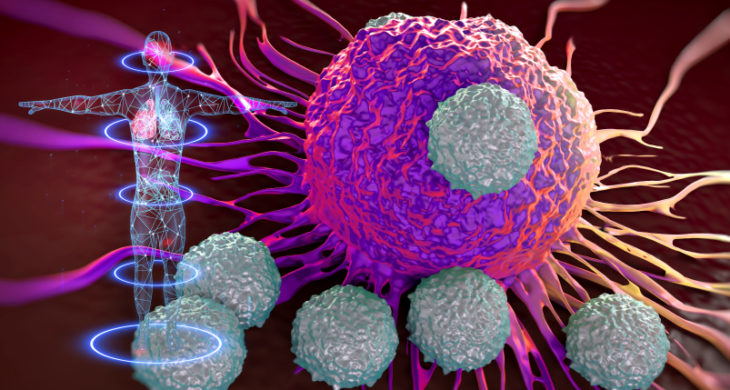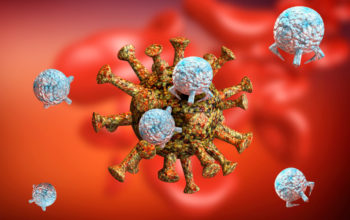
Date: 23rd July 2021
Estrogen receptor–positive breast cancer is the most common type of breast cancer and, once it metastasises, it is currently incurable. Whilst, targeted therapies such as endocrine therapies bind to estrogen receptors and inhibit estrogen signalling in breast cancer, often residual tumour cells persist, which leads to de novo or acquired resistance in primary tumours and nearly universal resistance in the metastatic setting. Now, researchers have discovered of a compound, called ErSO, that activates the anticipatory unfolded protein response (a-UPR) and induced rapid and selective necrosis of ERα-positive breast cancer in multiple orthotopic models resulting in tumour regression without recurrence, in addition it effectively induced regression of most lung, bone, brain and liver metastases.
Around 75% of breast cancers are estrogen-receptor positive, and treatment of drug-resistant ERα-positive breast cancer remains a major clinical challenge, with most patients with metastatic disease experiencing recurrence within 7 years. Whilst, resistant mechanisms are diverse, one major cause is mutations of ERα, leading to constitutive activation, which drives estrogen-independent tumour growth and increased metastatic potential. This has led to largely inhibition-based approaches to therapy which block estrogen signalling.
Now, researchers at the University of Illinois at Urbana-Champaign, US, led by David Shapiro, have discovered a compound, called ErSO, that activates the anticipatory unfolded protein response (a-UPR) and induced rapid and selective necrosis of ERα-positive breast cancer cell lines in vitro. Furthermore, in multiple orthotopic models ErSO induced tumour regression without recurrence, and effectively regressed most lung, bone, brain and liver metastases. Tumours that did not undergo complete regression and regrew, remained sensitive to retreatment with ErSO.
The team started by using a turn-on approach, in essence converting a tumour-selective protective pathway into a lethal, targeted anticancer response. One such pathway is the anticipatory unfolded protein response (a-UPR) and using a small-molecule (R)-1, referred to as ErSO, they found this hyperactivator could activate the pathway, eliciting a strong and sustain cytotoxic activation which selectively killed ERα-positive breast cancer cells including those harbouring known resistance-mediating ERα mutations in vitro.
To assess the drug in a more clinically relevant manner, they tested ErSO in orthotopic xenograft mouse models. They found ErSO treatment ablated wild-type and mutant ERα primary breast tumours, when ErSO was administered once a week either orally or intravenously, and at the highest does, the found complete regression of the tumours. Overall, 38 of 39 tumours regressed by >95%, with 18 of 39 regressing to undetectable amounts.
Next, the team explored the ability of ErSO to eradicate tumours growing in major metastatic sites. The data suggested a complete regression of lung metastases after primary tumour engraftment, and complete regression of large skeletal bone and cranial metastases upon ErSO treatment. Furthermore, animals with multiple metastatic lesions also showed complete regression of all metastases within 7 days of treatment. ErSO was able to penetrate the mouse blood-brain barrier and on average induced ~80% brain tumour reduction. In the majority of cases, this regression was followed with no recurrence occurring within 4 months.
Exploration of mode of action showed ErSO led to hyperactivation of the a-UPR and necrosis of breast tumours.
With such encouraging results the team lastly showed that ErSO had drug-like properties and was tolerated in multiple species. Showing no adverse effects, ErSO could be delivered either intravenously or orally, and daily dosing over a 7 days period no signs of cytotoxicity in ERα-positive tissues, such as the uterus and fallopian tube glandular epithelium and mammary ductal glandular epithelium, with no loss of ERα-expressing normal cells. This suggested that exposure to the drug had no effect on reproductive development.
Conclusions and future applications
The team here have developed an exciting new approach to treating ERα–positive breast cancer that was previously incurable. ErSO, a cytotoxic a-UPR activator, killed 95-100% of cancer cells in orthotopic mouse models, and their metastases in bone, brain, liver and lungs. Even in the few cases where regression was not complete, the tumours remained completely sensitive to ErSO retreatment.
One surprise was the speed at which ErSO worked, causing many of the breast cancers to shrink by more than 99% in just three days, suggesting the drug is super potent. The pharmaceutical company Bayer AG has licensed the new drug and will explore its potential for further study in human clinical trials targeting estrogen-receptor-positive breast cancers.
The researchers will now be looking to explore whether ErSO is effective against other types of cancers that contain estrogen receptors, potentially widening its application.
As metastasis is the major cause of cancer-related mortality, the ability to target these cells and halt progression would be highly valuable. Recent efforts to reveal drivers of metastatic cancer using CRISPR-tracing should be highly informative and give us critical insights such as the relationship between primary and metastasised tumours, the timing, frequency and destination of the metastatic seeding. Others have re-engineered human adenovirus to create ‘stealthy bombers’ able to evade host immunity and target metastases. Meanwhile, new classes of drug targets may inhibit other aggressive triple-negative breast cancer, and scientists have also discovered an ‘off’ switch for aggressive breast cancer which regresses tumours and prevents metastases. Together, this wealth of information and innovate technologies may give us a fighting chance of treating these aggressive, and often refractory cancers, offering hope to millions of patients.
The work here suggests more broadly that turn-on anticancer strategies, such as has been achieved with hyperactivation of the a-UPR via ErSO, may impart new therapeutic opportunities for known targets.
For more information please see the press release from the University of Illinois at Urbana-Champaign
Boudreau, M.W., Duraki, D., Wang, L., Mao, C., Kim, J.E., Henn, M.A., Tang, B., Fanning, S.W., Kiefer, J., Tarasow, T.M., et al. (2021). A small-molecule activator of the unfolded protein response eradicates human breast tumors in mice. Science Translational Medicine 13, eabf1383.
https://doi.org/10.1126/scitranslmed.abf1383


